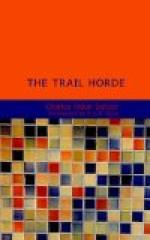“Ha!” exclaimed Antrim; “so you didn’t get no vent. Well, we’re aimin’ to look through your herd. We’ve been missin’ cattle all summer—from my ranch, the Circle Bar. About three thousand head. We’ve traced ’em as far as Kinney’s canon, an’ lost ’em. But we’ve been thinkin’, Blackburn, that it ain’t no hard job to make a passable Circle L out of a Circle Bar. That’s why we aim to look your cattle over.”
He grinned slightly at Blackburn’s scowl, aware of the impotent rage the latter felt over the worst insult that could be offered an honest cattleman. For an instant he watched Blackburn keenly, his lips sneering; and then when he saw that Blackburn had mastered his rage, he said, sharply:
“Who was that guy that rode away as we come up?”
“Lawler,” said Blackburn. “He’s figurin’ on seein’ you alone, looks like. He left word that when you come I was to tell you he wanted to see you.”
The outlaw’s eyes glowed with swift suspicion.
“He knowed me, eh?” he said. He glanced keenly over the level floor of the desert. Dimly, in the dusk, he could see Lawler riding near the herd. For an instant Antrim hesitated, plainly debating the wisdom of leaving his men; then he smiled with whimsical recklessness. And his movements became rapid, jerky.
“Slade,” he said, addressing a rider near him; “you’re runnin’ things till I get back.”
He wheeled his horse and sent him into the dusk toward the herd, riding cautiously, evidently not entirely convinced of the peaceableness of Lawler’s intentions.
He rode a quarter of a mile before he came upon Lawler; and though the light was fading he could plainly see Lawler’s face, set, expressionless.
The outlaw brought his horse to a halt within three or four paces of Red King. Antrim’s manner exuded the insolent tolerance of the master, who has the confidence that comes from thoughts of an overwhelming advantage.
He knew Lawler; knew him as perhaps no other man in the section knew him. For he had seen Lawler using his gun. It had been some years before, when Lawler had been proving himself—proving that he had a right to the respect and consideration of his fellow-men; proving that no man could trifle with him.
Antrim had been a witness to the shooting. He had marked Lawler’s coolness, the evenness of his temper; and had noted the deadly swiftness and precision of his movements when he had drawn his pistol. Lawler had not been the aggressor—a dozen other men had testified to that.
Antrim had not seen Lawler since, until now. And as he looked at him he saw that the years had brought a change in the man. He had been a tall, bold, reckless-looking youth then, with a certain wild waywardness in his manner that might have destroyed him, had he yielded to it. Now he was cold, calm, deliberate, imperturbable. The recklessness had disappeared from his eyes; they were now aglow with quiet determination. The waywardness had gone—ironlike resolution marked his manner.




